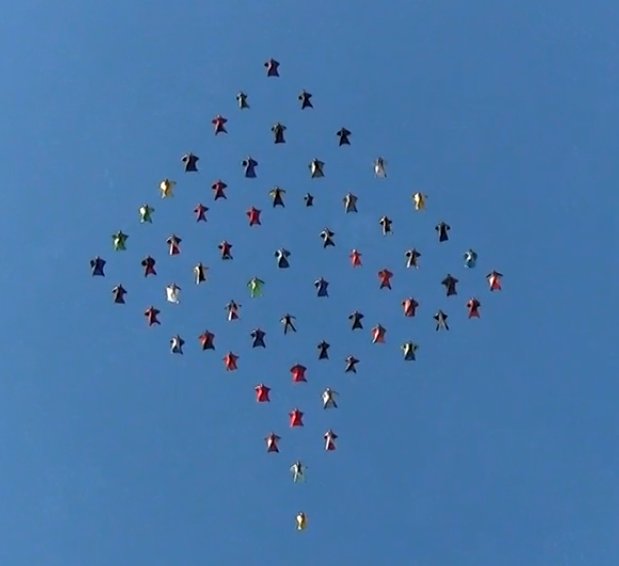Recommended Posts
wmw999 2,644
I think the point that Bill made earlier actually addresses that pretty well.QuoteYou can’t just shuffle the deck and come up with something new altogether. You may draw a new hand every time but it’s still just made up of cards.
Our cards aren't "person, monkey, hippo, mosquito." Our cards are:
.Quotethe same basic life processes - expression of genetic traits through DNA conservation and recombination, basic respiration, cell membrane construction, basic cell structure similarity etc.
We know that cards are a class, and hands are just selections from that class. But who'd think that diamonds and graphite are made of the same stuff? If you based your opinion on appearances, location, even geologic origin, you'd say no. But they're both carbon. Evolution is saying that there appears to be a natural pathway from the single cell to the diversity that we have today, and it looks for evidence of that (postulated) path.
Denying that there might be a path is kind of like saying "carbon and graphite can't be the same -- one is soft and black and we use it to write, and the other is clear and hard and we use it for jewelry, and they're found in different places" (etc. etc.)
Wendy W.
jaaska 0
kallend 2,227
www.forbes.com/forbeslife/health/feeds/hscout/2006/11/15/hscout536110.html
www.sciam.com/article.cfm?chanID=sa003&articleID=ECC43BE1-E7F2-99DF-39AD691683DE05AD
The only sure way to survive a canopy collision is not to have one.
wmw999 2,644
Wendy W.
Quote
I see. Since you (general reference to creationists, not you specifically) don't understand it, it can't possibly be true.
You're starting to sound like kallend... Everyone else has to prove their points, but all of your's are self evident?
pajarito 0
QuoteEvolution is saying that there appears to be a natural pathway from the single cell to the diversity that we have today, and it looks for evidence of that (postulated) path
Appearances can be deceiving. You've got to base your "science" on more than that.
wmw999 2,644
There are fish now that can breathe air, and frogs go from being water-breathing tadpoles to air-breathing frogs.
Wendy W.
jcd11235 0
QuoteQuote
I see. Since you (general reference to creationists, not you specifically) don't understand it, it can't possibly be true.
You're starting to sound like kallend... Everyone else has to prove their points, but all of your's are self evident?
You're kidding, right?
Read this thread and then tell me that evidence of creationism has been presented, or that no evidence of evolution has been presented.
BTW, there are many people I would like much less to sound like than Dr. Kallend.
pajarito 0
QuoteI guess that even if a nobel prize winner would try to explain to you things in simple english, you would not understand - or rather - you would not want to understand, if it was against your belief system.
I was told the same stuff you obviously were in school. I just don't necessarily buy into everything my college professor (or anyone for that matter) put out just b/c he had a PhD beside his/her name. There are plenty of others with that same title who have posed very real and critical problems with the theory. If you want to believe it, that's fine.
Quote"Evolution is unproved and unprovable. We believe it only because the only alternative is special creation which is unthinkable."
Quote
Since you (general reference to creationists, not you specifically) don't understand it, it can't possibly be true.
Well, I have to respond to you jcd11235.
My point was, you use the above bolded argument quite a bit. You're a smart guy, and have good input to these debates. But, when you fall back on that argument it comes across as condescending. Now, this is definitely a tangent to the current article.
BTW - I've spoken to several people regarding oil/euros. I've found more agreement with my argument than yours and the others.
Back to our current thread...
except for those of us who believe that the two are not alternatives at all.QuoteQuoteI guess that even if a nobel prize winner would try to explain to you things in simple english, you would not understand - or rather - you would not want to understand, if it was against your belief system.
I was told the same stuff you obviously were in school. I just don't necessarily buy into everything my college professor (or anyone for that matter) put out just b/c he had a PhD beside his/her name. There are plenty of others with that same title who have posed very real and critical problems with the theory. If you want to believe it, that's fine.Quote"Evolution is unproved and unprovable. We believe it only because the only alternative is special creation which is unthinkable."
--------------------------------------------------
jcd11235 0
QuoteQuote
Since you (general reference to creationists, not you specifically) don't understand it, it can't possibly be true.
Well, I have to respond to you jcd11235.
My point was, you use the above bolded argument quite a bit. You're a smart guy, and have good input to these debates. But, when you fall back on that argument it comes across as condescending.
If you notice how many times the objections were raised and addressed, you'll see why I gave up attempting to further explain evidence of evolution to those who choose to not understand.
I think if you investigate further, you'll find that I make such arguments as above infrequently relative to more in depth responses.


.thumb.jpg.4bb795e2eaf21b8b300039a5e1ec7f92.jpg)



Let's take an example from computing.
Let's say you find a program and download it. You don't do anything with it, just download it. Has new information been added to your computer? Using your argument, I would claim no - your computer only has a finite number of ones and zeroes in it, as it always did. You didn't add memory, or hard drive space, you just changed the pattern of those ones and zeroes. They have just been re-organized.
Now, that program may not work. Indeed, if you just download a program at random, it probably won't - it will be the wrong OS or something. But the new information is there. Most people would argue that your computer DOES have new information in it, even if it doesn't do anything useful.
And amazingly, just by reorganizing those ones and zeros, you can sometimes do some cool stuff. Often it does nothing, or does something boring (like a spreadsheet.) But sometimes it lets you play an interesting game. All just by reorganizing (and recombining) the patterns already there.
Likewise, during sexual reproduction, an organism gets a load of new information - half from one parent, half from the other (roughly.) Most of the information doesn't do anything. Some of it codes for the usual expressions of proteins we recognize as our phenotype. Some of it is useless without other bits and pieces. Some of it causes harm unless there are other bits and pieces. Some of it does very good stuff for us - again, only if other bits and pieces (often coming from the other parent) are there.
In other words, with nothing more than the two sets of original DNA, you can come up with completely new patterns that do things you wouldn't expect, looking at the phenotypes of both parents.
Now you add in the random factor - random mutations, random translocations, random meiosis oddities. You now have a new genome that's not only a combination of both parents, but also has some completely new stuff in it. 99.99% of the time, that new stuff does nothing. Sometimes it's bad. But very rarely, it does something interesting. In humans, that means sometimes we have a third arm, or an extra kidney, or a tail.
Now, we don't need tails. But if we did, that kid with a stubby tail would have a slight survival advantage over kids who don't - and that new mutation/translocation would survive in the gene pool. Voila! New tail.
>Copying errors produce results like this.
Right - and what you call "copying error" other people call "evolution." Spiders have eight legs instead of six - that was probably a HOX copying error.
>I have a polydactyl cat with an extra toe on its front paws. It’s still a
> cat. If it grew another toe on each paw, it would still be just a cat
> (genetically speaking).
Good example. Yep, its genome is still so similar to other cats that it can reproduce. But let's say you isolate it (and its descendents) from other cats and breed for polydactyly. Eventually you'll get cats with a lot of extra toes, and its genome will reflect the difference. At some point its genome will change so much that it will no longer be able to interbreed with other cats - and it will have become a new species. It may still look like a cat, but it's not a cat any more (genetically at least.)
>Re-sequencing of pre-existing information will result in a
>new “sentence” but not one consisting of additional information that
>wasn’t there before.
That's correct - just as re-sequencing the letters of the alphabet will not produce any new letters. Yet combinations of the letters of our alphabet have produced every single book in every bookstore in the US.
>Duplications/insertions are a good way of destroying the
>functionality of existing genes.
A great many organisms regularly go from diploid to haploid to deal with lack of fertilization. Many grasses can reproduce sexually (diploid; two sets of chromosomes) or asexually (haploid; one set.) Doesn't hurt them, because they're set up to handle it.
>It’s an increase in information but not new information.
Again, there's no change in the underlying number of base pairs. There are still just 4. But they are now arranged in a different way. And that arrangement is what defines us genetically.
Share this post
Link to post
Share on other sites